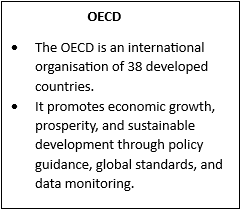Syllabus:
GS-2: Bilateral, regional and global groupings and agreements involving India and/or affecting India’s interests.
Context:
Recently, India and Israel signed a bilateral investment agreement in New Delhi to boost bilateral investments between the two countries.
More on the News
- Israel is the first member state of Organisation for Economic Co-operation and Development (OECD) to sign bilateral investment agreement with India since the adoption of the Model BIT in 2016.
- It replaces the previous agreement signed in 1996, which was terminated in 2017 as part of India’s policy regarding its investment treaties.
Key Features of the Agreement

- Boost Investments with Legal Certainty: The agreement promotes trade and mutual investments by providing greater certainty and protection for investors, by guaranteeing minimum standards of treatment and transparent rules.
- Dispute Resolution: It facilitates growth of trade and investments with dispute resolution mechanism through arbitration.
- Strong Investor Protection: It safeguards investors against expropriation, ensures free transfer of funds, and provides for fair compensation in case of losses.
- Balanced Sovereignty and Regulation: While strengthening investor rights, the agreement preserves the host state’s policy space, allowing governments to regulate in the public interest.
Area of co-operation between India and Isreal
- Economic Ties: The bilateral investments between the two countries presently stand at total of USD 800 million.
- Defence and Security cooperation: Barak-8 is a joint Indo-Israeli medium and long-range surface-to-air missile (SAM) system developed by India’s DRDO and Israel’s Israel Aerospace Industries.
- Science and Technology: The India-Israel Foundation for Research and Development (I4F) supports leading and disruptive Research and Development project related to Biological, Physical & Human Integration with Autonomous Systems.
- Regional Cooperation: The I2U2 Group comprising India, Israel, the UAE, and the USA is a strategic partnership to drive joint investments and projects in water, energy, transport, space, health, and food security.
Bilateral Investment Treaty (BIA)
- BITs are agreements between two countries for the reciprocal promotion and protection of investments in each other’s territories by individuals and companies.
- BIAs fall under Article 38(1)(a) of the International Court of Justice Statute as primary sources of obligations in international law.
- India’s first BIT was signed with the United Kingdom on March 14, 1994, and entered into force on January 6, 1995.
Key Features of BIA
- National Treatment: Foreign investors are treated on par with domestic investors.
- Most-Favoured Nation Treatment: An investor from one country receives the same treatment as an investor from any other country, provided that country has a more favourable BIT.
- Fair and Equitable Treatment: Investments are to be treated in accordance with principles of international law and standards.
- Full Protection and Security: Investors receive physical and legal protection for their investments and are offered compensations.

